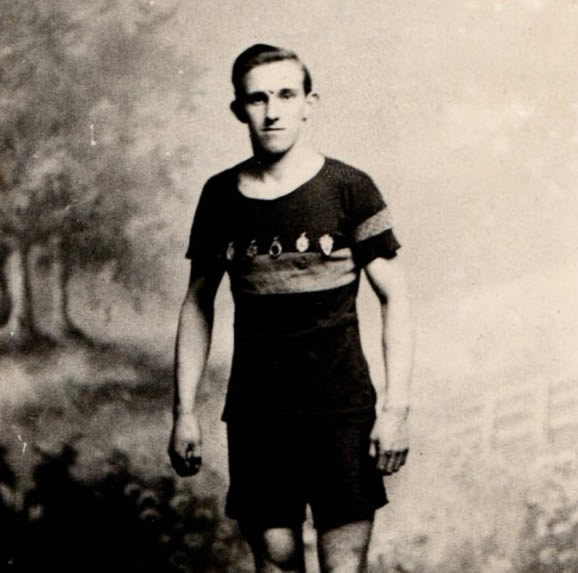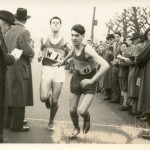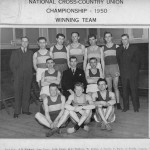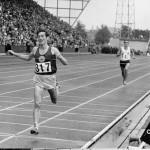our history
The beginnings
In 1904 Bob Nicol and Donald McColl of West of Scotland Harriers visited the Howieson brothers of Shettleston area, the inaugural meeting took place in Houston’s Tearoom in Shettleston near Eastbank Academy.
Donald McColl was elected president, Bob Nicol secretary and John Howieson treasurer. A small shop in Gartocher Road, part of the Old Allan Scally Road Relay Trail, became the first clubhouse.During 1922-24 also saw J. Howieson the President of the National Cross-country Union of Scotland.
Our Club
Highlights
- 12 Scottish titles between 1947 and 1977including four in row (1959-62).
- 6 national junior titles during the same period.
- 22 wins at junior, youth and boys level.
- An unequalled number of victories in the prestigious Edinburgh to Glasgow eight-stage relay, including 11 gold medals, silver and 4 bronze.
Club
Timeline

1904
Formation of Shettleston Harriers when Bob Nicol, Donald McColl visited the Howieston brothers.

1922-24
During 1922-24 also saw J. Howieson the President of the National Cross-country Union of Scotland.
1933-37
Jimmy Flockart, arguably one of Scotland’s best-ever cross country runners. Won the Scottish title four times between 1933-37, and became the first “home” Scot to win the International Cross Country Union in Belgium in 1937.

1954
The second 50 years of the club is possibly the most notable for achievement and development. In 1954 Joe McGhee won the Empire Games Marathon in Vancouver, a race more remembered for the dramatic finish of Englands Jim Peters in a state of collapse with exhaustion. Few remember that Joe McGhee went on to win that race on that very difficult day.
Late 1950's - Early 1960's
1950s dominance of the Marathon by Joe McGhee was to be followed by success in the Mile Event by Graham Everett who represented Scotland at the Empire Games of 1958. In the 1960s, Norman Foster made a great impact in Pole Vault and field events, representing Scotland in the Commonwealth games in Jamaica.

1970's - 1980's
Arguably the most famous Harriers of all time were to follow in the 1970s and 80s with Lachie Stewart and Nat Muir. Lachie winning Gold in the 1970 Commonwealth Games in Edinburgh and Nat dominating the Cross Country and road scene both in Scotland and the UK. Both men were also tremendously successful on the track during this time.
2002
2002 saw a significant ‘high’ in the clubs history as we again regained our place at the forefront of Scottish Athletic honours ,winners of National Cross Country and 6 Stage Relay and in the top 3 placings in almost every other race.
History
Allan Scally
Allan was born in 1904, the year Shettleston was founded and as a young runner made his name in the professional ranks, winning the Powderhall 10 Mile Championship five times between 1927 and 1932. In winning the Powderhall 10, Allan held the title of World Professional 10 miles champion, a title that could only be contested by a challenge match. Allan was challenged frequently over the years, the most memorable being from R.E.Cole of Hereford.
The Allan Scally Road Relay Race
History
Allan Scally
Races were held at White City Racecourse, Glasgow, and on 7th July 1928 before a capacity crowd, Allan retained the title of World 10 mile champion. As was customary at the time Allan competed at Sports meetings and Highland Games throughout the country invariably being ‘scratch’ man on most occasions. He ran at ‘Royal Braemar’ and was chastised by the commentator for ‘warming up’ before the race- apparently not allowed when the King and Queen were present.
At Powderhall in 1933 and 1934, Allan finished second and third,the winner being a pupil of his. This fact so impressed Allan that it pointed his way in athletics-finding and helping youth. Thus ended the professional career of Scally of Broomhouse and what Powderhall lost, Shettleston gained. It was a great regret to Allan that he never wore the Blue and Gold of Shettleston, but as he considered his own running career over by then, he poured all his energy and experience into coaching and was main contributor to the clubs success in the late 1940s and early 1950s.
The Champions coached by Allan are too numerous to mention, but some who did benefit from his advice include J.Flockhart, the first Scot to win International Cross Country honours with national championships following in the years ahead. Allan Watt , who won the English 100 yards title in 1947 and 48-who came to Shettleston as a high jumper and was turned into a sprinter by Allan.
What were the characteristics to be found in one so influential? Some will say a great runner in his own right, the urge to win, or a rare genius for transmitting ideas and motivation to those around him. Undoubtedly his most outstanding qualities was the uncanny ability to see potential in young athletes in Track or Country. Allan also acted for many years as coach and official for the SAAA and was widely known across athletics in Scotland.
For the full history and results for the 50 editions of the Scally please click here. Thank you to Ron Morrison.

